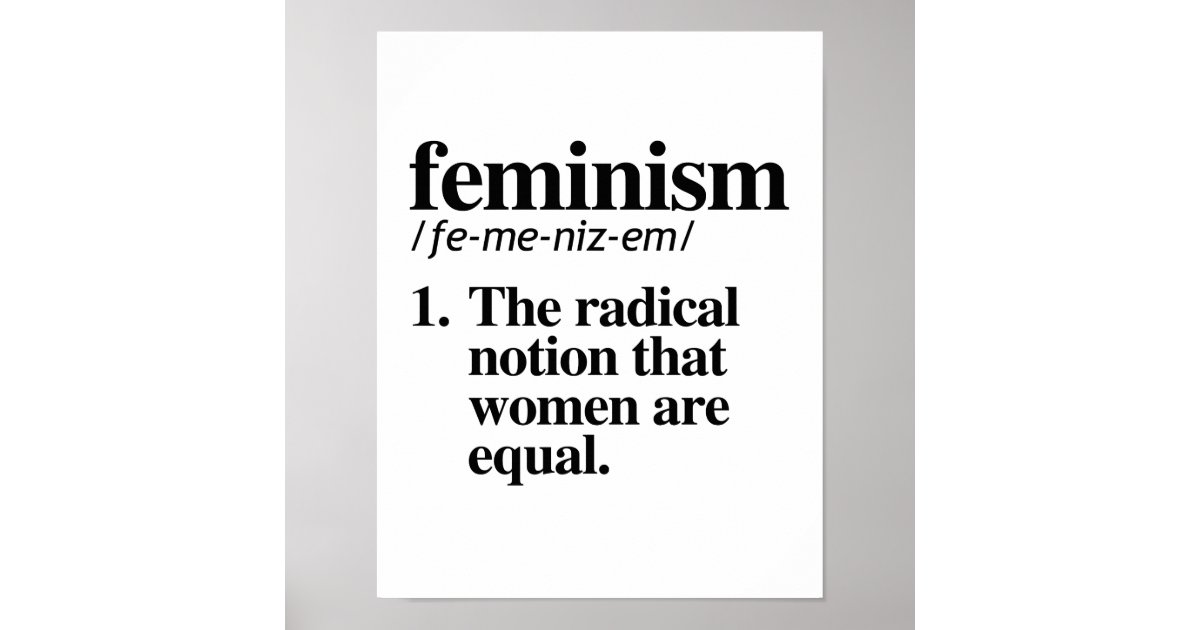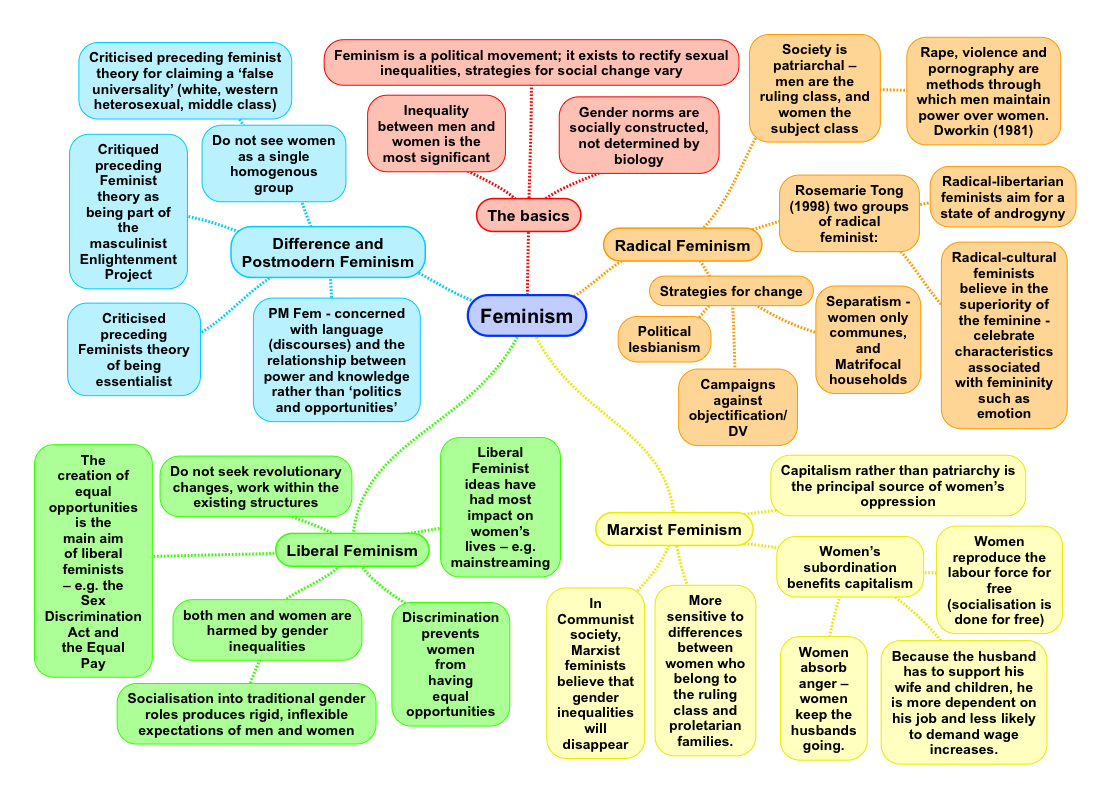Have you ever pondered the complexities of gender equality? Or wondered why certain issues, like the right to abortion or reproductive autonomy, spark such heated debates? The answer often lies in the realm of feminist thought, and specifically, a branch known as radical feminism. It’s a movement that challenges the very fabric of society by demanding a complete transformation of power dynamics between men and women.

Image: www.zazzle.com
This article delves into the intricate world of radical feminism, exploring its origins, core principles, and enduring impact. We’ll examine how it differs from other feminist ideologies and analyze its role in shaping contemporary feminist discourse. By understanding radical feminist perspectives, we can gain a deeper insight into the ongoing struggle for gender liberation and the complexities surrounding the pursuit of equality.
Origins and Evolution of Radical Feminism
The seeds of radical feminism were sown during the second wave feminist movement, which gained momentum in the 1960s and 1970s. This period saw a surge in women’s activism, demanding equal rights and challenging discriminatory practices. However, radical feminists felt that mainstream feminism was insufficient. They argued that societal institutions, including the family, marriage, and even the legal system, were inherently patriarchal and reinforced male dominance.
Early radical feminists like Shulamith Firestone and Kate Millett explored the roots of female oppression in the biological differences between men and women. They believed that men’s dominance stemmed from their control over women’s reproductive capabilities and the expectation of them to bear children and perform domestic labor.
The 1970s saw a proliferation of radical feminist groups advocating for radical solutions. These ranged from promoting lesbian separatism – a belief that women could achieve liberation by separating themselves entirely from men – to questioning the traditional nuclear family structure and exploring alternatives like communal living.
Core Principles of Radical Feminism
Central to radical feminism is the conviction that women’s oppression is systemic. This means that it’s not simply a matter of individual prejudices or acts of violence but a deeply ingrained structure woven into the very fabric of society. Radical feminists see this oppression as stemming from patriarchal systems that grant men inherent power and privilege over women.
Some key principles of radical feminism include:
- Patriarchy as the Root Cause: Radical feminists emphasize that patriarchy, not individual men, is the primary source of women’s oppression. They argue that patriarchy permeates all aspects of society, from political institutions to everyday social interactions.
- The Personal is Political: This principle underscores the interconnectedness of personal experiences with broader societal structures. Radical feminists recognize that seemingly “private” issues like domestic violence, sexual assault, and reproductive rights are deeply political and reflect the power imbalances inherent in patriarchal societies.
- The Importance of Sisterhood: Radical feminists place a strong emphasis on women’s solidarity and the creation of women-only spaces. These spaces are seen as crucial for empowering women, sharing experiences, and developing collective strategies for change.
- The Need for Revolution: Rather than seeking incremental reforms, radical feminists advocate for a complete transformation of power structures. They believe that true liberation requires dismantling the existing patriarchal system and creating a society based on gender equality.
- Emphasis on Women’s Experiences: Radical feminists emphasize the importance of listening to and validating women’s experiences, particularly those who have been marginalized or silenced by patriarchal power structures.
Radical Feminist Ideas in Action
Although radical feminism may seem abstract, its principles have manifested in various social movements and activism throughout history. Here are a few examples:
- The Fight for Reproductive Rights: Radical feminist activism has played a pivotal role in the struggle for women’s control over their bodies. From challenging restrictive abortion laws to advocating for access to contraception and comprehensive sexual education, radical feminists have consistently fought for reproductive autonomy.
- The Movement Against Domestic Violence and Sexual Assault: Radical feminists have been at the forefront of raising awareness about violence against women, challenging the normalization of domestic violence and sexual assault, and advocating for stricter laws and support systems for victims. They have also criticized the tendency to blame victims and challenge the societal systems that perpetuate these forms of violence.
- The Struggle for Economic Justice: Radical feminists have been active in fighting for economic equality for women, challenging the wage gap and advocating for equal pay for equal work. They have also critically examined the ways in which women are disproportionately affected by poverty and lack of access to economic opportunities.
- Challenging Gender Roles and Stereotypes: Radical feminists have worked to deconstruct traditional gender roles and stereotypes, pushing back against societal expectations that limit women’s choices and force them into predefined roles. They have advocated for greater diversity in representation and challenging the media’s portrayal of women.

Image: www.dictio.id
Criticisms and Controversies
Despite its contributions to feminist discourse and activism, radical feminism has also faced significant criticism. Some of the most common criticisms include:
- Lack of Inclusivity: Critics argue that radical feminism fails to adequately account for the experiences of women of color, trans women, and other marginalized groups. They claim that radical feminism’s focus on the universal oppression of women can overlook the intersecting nature of oppression and the unique challenges faced by different groups.
- Excessive Focus on Men as Oppressors: Critics point out that radical feminism’s emphasis on patriarchy as the sole cause of women’s oppression ignores other forms of power dynamics and oppression, such as those based on race, class, and sexual orientation.
- Anti-Sex and Anti-Male Bias: Some critics accuse radical feminists of being anti-sex and anti-male. They argue that radical feminism’s focus on challenging societal structures can lead to hostility towards individual men and an overly negative view of sex and intimacy. This criticism is often rooted in a misunderstanding of radical feminism, which does not necessarily advocate for the abolition of sex but rather seeks to challenge the power imbalance that often exists in sexual relationships.
- Effectiveness of Revolution: Critics question the practicality of radical feminism’s call for a complete revolution of societal structures. They argue that such a radical transformation is unrealistic and that incremental change is a more effective approach to achieving gender equality.
Contemporary Relevance and Evolution
Despite these criticisms, radical feminism remains a powerful force in shaping contemporary feminist discourse. It continues to inspire activists and thinkers who are seeking a fundamental transformation of power relations. In recent years, radical feminist ideas have been interwoven with movements like intersectional feminism, which acknowledges the interconnectedness of different forms of oppression, and trans feminism, which recognizes the unique experiences and needs of trans women.
The rise of online platforms has also provided a new space for radical feminists to connect, share ideas, and organize. Online communities and social media have become important tools for raising awareness about issues like gender-based violence, challenging misogynistic rhetoric, and promoting feminist organizing.
While some might argue that radical feminism is outdated or too extreme, its core principles remain relevant in a world where gender equality is still far from being achieved. From challenging the societal structures that perpetuate gender inequality to advocating for the empowerment of women and the dismantling of patriarchal systems, radical feminism’s legacy continues to resonate in the ongoing struggle for gender justice.
Radical Feminist Meaning
Conclusion
Navigating the complex landscape of feminist thought can be challenging, but understanding the meaning of radical feminism can be a valuable tool. By recognizing the systemic nature of women’s oppression, embracing the interconnectedness of personal experiences and broader societal structures, and advocating for revolutionary change, radical feminists have played a vital role in shaping the feminist movement. While criticisms exist, the enduring power of radical feminist ideas lies in their unwavering commitment to dismantling patriarchal structures and creating a world where all people can live in equality.
As you continue your journey to understand feminist perspectives, consider exploring the writings of various radical feminist thinkers, engaging with online communities, and participating in organizations that advocate for gender justice. Remember that the fight for equality is an ongoing process, and by embracing the ideas and insights of radical feminists, we can contribute to building a more just and equitable future for all.






